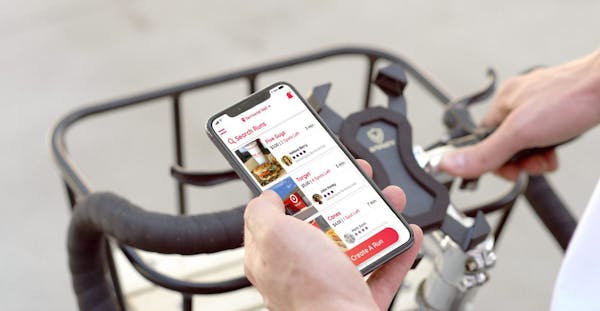Gus Gehlen, who grew up wakeboarding on lakes around the Twin Cities, has been living in Seattle while he and two buddies living in other states formed a business making life vests with built-in speakers for rocking out on the water.
When they saw that the organizers of Twin Cities Startup Week were offering to pay techies across the country to fly in and check out the local tech scene, he decided it was a good time for the trio to meet face-to-face and plot the future of their Groove Water Sports.
"We're in the early business development stage," Gehlen said. "We need to be around these people who are in similar places with their businesses."
For the second year in a row, the organizers of Twin Cities Startup Week reached out nationwide to entrepreneurs and technical talent with an offer to pay $300 of their transportation costs to attend the conference and, if they wanted, three other innovation-related gatherings in the metro area this week.
The initiative, apparently unique among U.S. technology conferences, reflects the extreme need for tech workers in the Twin Cities and local businesses' willingness to get inventive to attract them. The approximately $12,000 cost is viewed by organizers Beta.MN and Greater MSP, the regional economic development promoter, as a relatively inexpensive recruiting tool.
Last year, 21 people took up the offer and seven moved to the Twin Cities. This year, 39 people came. Some were like Gehlen, searching for ideas, mentors and capital. Others sought to expand their own businesses to the region, and others were looking for jobs.
The attendees, who became known as "fly-ins" among other Startup Week attendees, had to cover their other expenses, including food and accommodations.
"If you need a job, let me know," Matt Lewis, a Greater MSP executive, said at the end of a bus tour the fly-ins took Tuesday evening. "We have 63,000 of them," he added, referring to the state's latest job vacancy data for the Twin Cities.
"I think it's a pretty innovative way to get talent," said Jamal Love, who arrived from Boston partway through the week. "Especially with people in their 20s and 30s, it clicks."
Francene Nguyen, who lives in San Jose, Calif., and worked for financial technology and health technology firms in Silicon Valley, handed her résumé to the chief executive of a local financial technology firm after one Startup Week panel. "The common theme I'm finding is the sense of community here is really great," she said. "It's expensive there, and I'm looking to be part of something that's collaborative beyond the walls of the company. Definitely, this is somewhere I could see myself."
The fly-ins started each morning with breakfast at a different co-working space to touch base with one another and Startup Week organizers. They also kept in touch via the Slack messaging app.
Corwin Harris of East Lansing, Mich., saw an application for the fly-in program in a Twitter ad just last month. Having just left one tech job, Harris and his wife had thought about returning to their hometown of Cleveland, where they were already familiar with the local tech scene. But they decided he should see what the Twin Cities had to offer. "I love how vibrant the startup community seems to be here," Harris said.
Jessica Chin, who recently finished graduate school in Washington, was looking for a job when she applied to be a fly-in at Twin Cities Startup Week. But last week, she accepted a job with an energy firm in Boston. She came anyway and wound up in discussions about the future of farming, the impact of social enterprises and at product demonstrations with startup founders and CEOs of large companies. "It was amazing to have these people of all range of positions in the same space," she said.
The gloomy cold that dominated the weather until Friday did little to help the promoters and job recruiters. And many of the fly-ins had questions about winter. "The only thing I would have to get used to is the extreme cold weather," Derek Fields, a web developer and entrepreneur from Baltimore, said when asked about his readiness to move.
David Elliston, a technology recruiter in Charlotte, N.C., and his wife have already decided to move to the Twin Cities early next year. Minnesota's cold weather, he said, would be no problem since he grew up in Michigan. "If I move in January, it may be a bit of a shock to the system," he added. "But we'll figure it out."
Tommy Khoo, a Singaporean who just finished a Ph.D. program in applied mathematics at Dartmouth, said he thought he'd have no problem with winter. "I've lived in New Hampshire for five years and it's frozen half the time," he said.
For him, the biggest surprise of his visit was the diversity of the regional economy. "I know you are famous as a medical alley. But as a foreigner, I had not heard that until I got here," Khoo said. "You also have financial technology and data science. It's really surprising to me how thriving this place is."
By Thursday, Gehlen and his colleagues in Groove Water Sports, Drew Bartek of Charlotte, N.C., and Miles Ukaoma of Austin, Texas, had met enough people and been to enough workshops to realize that some ideas for building their recently patented life vests needed to be changed.
They were preparing a crowdfunding campaign to raise money before manufacturing. But startup execs they met this week persuaded the trio to arrange manufacturing before promising a product to consumers and investors. "All three of us have gained more clarity to a lot of questions we had," Bartek said.
evan.ramstad@startribune.com 612-673-4241

